Advertisements
Advertisements
प्रश्न
Observe the tourist leaflets given and answer the following.

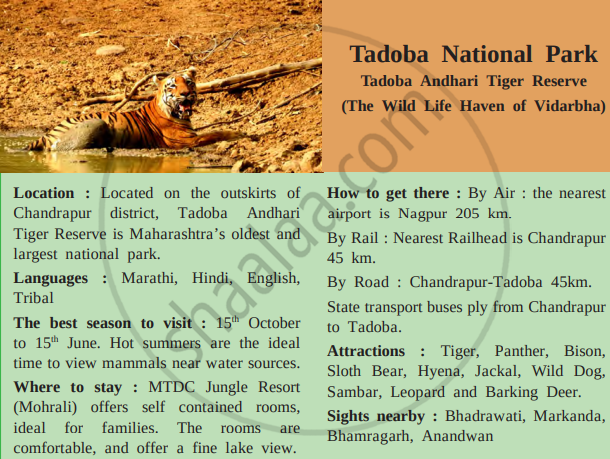
- Which places do these leaflets describe?
- What are the main points given in each leaflet?
- How can one reach Tadoba?
- Which is the best season to visit Tadoba? Why?
- List tourism-related words, e.g., tourist, booking etc.
उत्तर
- These pamphlets describe 'Sindhudurg' and 'Tadoba National Park'.
- The main points given in each leaflet are
- Location
- History
- Languages
- The best time to visit
- Where to stay?
- What to see?
- How to go there? (by air, by rail, by road)
- Sites nearby.
- Tadoba may be reached by plane via Nagpur. To get to Tadoba National Park, take a train to Chandrapur and then take a 45-kilometre bus ride from there.
- The ideal time to visit Tadoba is during hot summers (15th October to 15th June) to observe animals around water sources.
- Tourism-related words are-
- Tourist
- Fight
- Mountains
- History
- Booking
- Train
- Hill station
- MTDC
- Travel
- Buses
- Fort
- ST
- Ticket
- resort
- Trek
APPEARS IN
संबंधित प्रश्न
Join the following sentences to make one complete sentence without using and but or so :
(i) He was very ill. He did not take any medicine.
(ii) You come back from your holiday. We will discuss the problem.
(iii) He remained absent on Friday. It was foolish of him.
(iv) Rahul ran all the way to the bus stop. He missed the bus.
The poet refers to a dying fire. Who were sitting beside it and why?
What is the implied meaning of “his bars of rage” in the poem “I Know Why the Caged Bird Sings”?
Your uncle has offered to get you a pet for your birthday. Write a letter to him telling him what you would like, give reasons for your choice and tell him how you Would-take care of your pet.
Ichabod Crane, the central character of the short story 'The Legend of Sleepy Hollow', is a person who arouses both our amusement and pity. Discuss.
In the poem Breaking Out. the poet shows the gradual transformation of a young girl into a confident and independent individual who breaks the conventional stereotypes of society. Discuss with close reference to the text.
You are the President of the Nature Club in your school which is hosting the Earth Day Celebrations. Write a letter to the Principal of a neighbouring school inviting the school to participate in the event. State when, why and how you plan to celebrate Earth Day.
Re-write the following sentence according to the instructions are given. Make other changes that may be necessary, but do not change the meaning of the sentence.
Has Alia written to you?
(Begin: Have you……….)
Have you heard any boatmen’s songs? What kind of emotions do these songs usually express?
Given below is an interesting combination of words. Explain why they have been used together.
ghostly dust devils
Given below is an interesting combination of words. Explain why they have been used together.
scientific detachment
Look at the highlighted expressions in the following sentences from the text and explain their figurative meaning.
- 'I went through it, sir, with a fine-toothed comb and never a Garrideb could I catch.'
-
'They are my favourite covert for putting up a bird, and I would never have overlooked a cock pheasant as that.'
-
'There is no bolt-hole for you in this country.'
-
'When his castle in the air fell down, it burred him beneath the ruins.'
Complete the following web diagram.

What vocation / profession / business would you like to take up in the future? Prepare a fact file for the same using the following points.
- Name of the vocation / profession / business ____________
- Educational qualifications required ____________
- Work profile / description ____________
- Opportunities for advancement ____________
- Your personal skills / talents for the choice ____________
Choose the correct alternative for the given line. Focus on the inference of the poet.
‘Earth has not anything to show more fair:’
The line means - _________________.
From the passage, find and write any two examples of the following:
Sentences containing
- 'must'
- 'can'
Write an imaginary dialogue contesting opposite views on a topic of your choice, e.g., ‘Girls should learn to do all the housework and not boys.’
Imagine you are the lion and someone is interviewing you.
Write the answer to the following question.
Who were your companions on the way to Oz?
Create a Personal Particular for your class with support from your teacher and collect personal and educational information.
You are waiting for your exam results. ______
Write a letter of enquiry for the following.
Your a librarian in a newly established school. Write a letter to the book dealer inquiring about the list of newly arrived English children's story books and various subject books relevant to 10-14 age groups.
What does Sarojini Naidu say about the Wandering Singers? Write in your own words. (in about 60 words)
Now make one more question for each picture. Write the question in the space below each picture. Use how many, what are, where are/is, how, why, to make questions.
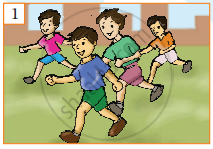 |
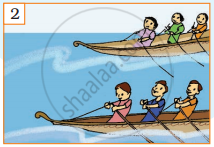 |
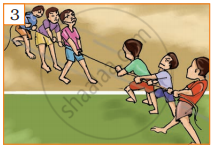 |
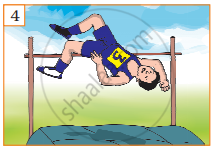 |
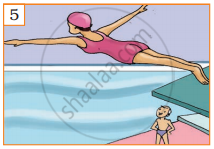 |
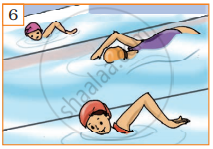 |
What were the strange instruments the nurse carried to the surgery? How did the waiting patients interpret her act?
Now write a short story to explain these proverb.
Actions speak louder than words
Observe the following picture and write a paragraph in about 150 word about each one of them.

Answer the following question as briefly as possible and with close reference to the relevant text.
Referring closely to the short story, B. Wordsworth relate two important lessons that the young narrator learnt from his friend, B. Wordsworth. How were these lessons relevant?
Imagine someone has invited your family to a programme and you were the only person at home when the invitation was given orally.
Write a note (4-5 lines) to pass on the message to the other people in your family. Or, Write an imaginary conversation in which you pass on the message to your parents.
What might success mean to the following people? Think about it and write.
A teacher
Write points and counterpoints on the following topic:
You should study all subjects in your mother tongue
